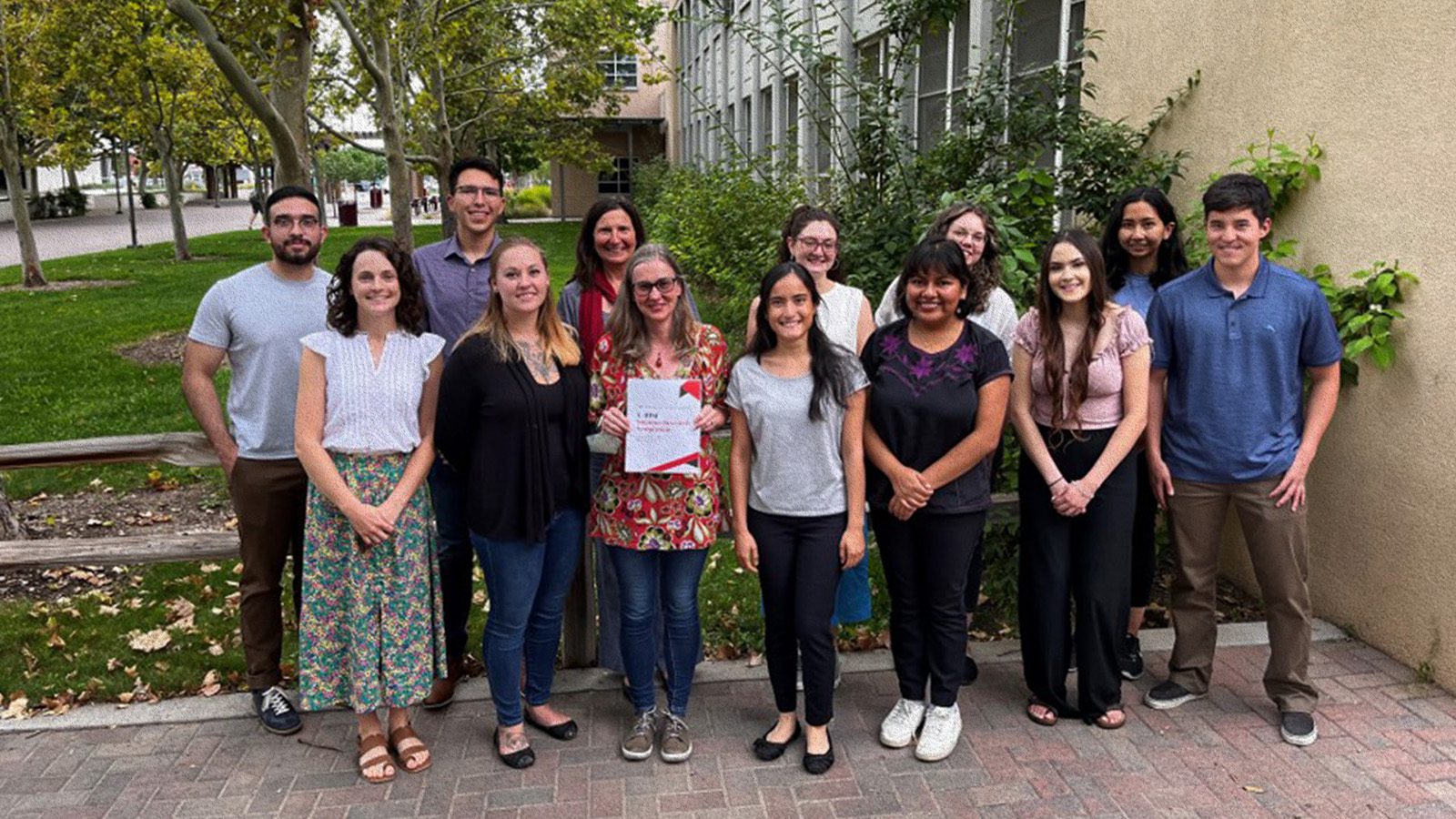
Participants in the U-RISE Summer Research Symposium in August gave presentations about their projects and received feedback and support. Back row: Julian Rojo, Diego DeMmon, Cristina Takacs, Conner Mertz, Ellie Larence, and Adina Abudushalamu; Front row: Jenna Fonta, Brandi Hess, Helen Wearing, Daisy Belmares-Ortega, Brenda Ramos Villanueva, Alexa Gonzalez, and Brendan Sanders. Not pictured: Marelessis Palomino.
Among the many programs for student researchers at The University of New Mexico, the only school in the state with the prestigious R1 designation from the Carnegie Classification of Institutions of Higher Education, is the Undergraduate Research Training Initiative for Student Enhancement (U-RISE). At the center of the U-RISE experience is research.
U-RISE supports motivated students from underrepresented groups to pursue graduate education in biomedical research, explained program manager Jenna Fonta, who also serves as a student mentor.
“We aim to remove barriers they might encounter on their way to graduate school. We help them connect with research mentors at UNM or support them with the relationships they already have with research mentors,” she said.
The other primary faculty are program director and Biology department chair Cristina Takacs and associate director and professor of Biology Helen Wearing. Ph.D. student Conner Mertz serves as a peer mentor for U-RISE participants. Principal lecturer from the English department Julianne Newmark and a grad student working with her, Catherine Hubka, teach the writing courses for U-RISE students.
Hispanic, native, black and other under-represented ethnicities make up only about 8 percent of the biomedical scientists in the U.S., Fonta said.
“We have a very diverse student population at UNM, and we want to support underrepresented students in pursuing fulfilling careers in biomedical science. Many students are not aware of the path to take to prepare for graduate school or may not have consistent funding to fully focus on their undergraduate work and research or lack mentors in the field to guide and support them. U-RISE is here to fill in any gaps for these already motivated students,” Fonta said.
U-RISE recruits rising juniors who have a GPA at or above 3.2, have strong letters of recommendation, and show commitment to a career in biomedical research, she noted. Students are required to participate in research at an institution outside of New Mexico to get more exposure to the biomedical science community and make professional connections and practice presenting their research in on-campus symposia and each year at the Society for Advancement of Chicanos/Hispanics & Native Americans in Science (SACNAS) annual conference. Students travel to the annual SACNAS conference to present posters on their research. During the summer leading into their final year, they travel to institutions outside of New Mexico to participate in summer research programs.
“It’s important for students to get out of their comfort zones and push themselves to learn new skills. In their summer research, they must quickly learn about a new topic of research, learn new techniques, and use those techniques to contribute to the research project. They also learn how to work with another PI and lab colleagues. Making good connections at another institution strengthens their network and their grad school applications,” Fonta said.
U-RISE gives participating students a solid start on a career path and students who have a community of support are more likely to achieve their goals, Fonta said.
Recent graduates have gone on to John’s Hopkins University, University of Colorado Denver, Duke University, and the Max Planck Institute.
“We mostly focus on research careers in academia as professors and principal investigators since our ultimate goal is for the U-RISE scholars to go on and earn a Ph.D. or a dual degree like an MD/Ph.D. However, we also introduce the scholars to alternative career paths including scientist in industry or the National Labs, or starting a new biotechnology company,” Takacs said.
Current scholars in the U-RISE program are:
Adina Abudushalamu, majoring in Biochemistry with a minor in Computer Science, and currently identifying a research mentor.
Daisy Belmares-Ortega, majoring in Mechanical Engineering with a Minor in Applied Mathematics, and mentored by professor Rama Gullapalli of the UNM Department of Pathology.
Diego DeMmon, majoring in Chemistry and Biology, and mentored by professor Iréne Salinas, Department of Biology.
Alexa Gonzalez, majoring in Biology and Spanish, and mentored by Mubarak Syed, Department of Biology.
Brandi Hess, majoring in Biochemistry, also mentored by Syed.
Ellie Larence, majoring in Computer Science, and mentored by Melanie Moses, Department of Computer Science.
Marelessis Palomino, majoring in Chemical Engineering, and mentored by Diane Lidke, Department of Pathology
Brenda Ramos Villanueva, majoring in Biology, and mentored by Christopher Witt, Department of Biology
Julian Rojo, majoring in Chemical Engineering, Bioengineering concentration, with minors in Mathematics and Chemistry, also mentored by Lidke.
Brendan Sanders, majoring in Biochemistry, and mentored by Mark McCormick, Department of Biochemistry and Molecular Biology.
“In our program, we not only prepare students to get accepted into top graduate programs, we prepare them to thrive once in those programs. They will use the skills they start to build here throughout their careers,” Fonta added. “In U-RISE, we create a little community of students who are all working toward the same goal. The U-RISE team of faculty and staff all have graduate degrees and are here to support and mentor students in their journey to finish their degrees and enter graduate school with confidence.”
Related article
Undergrad researchers search for answers in Neural Diversity Lab
